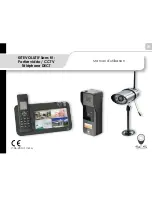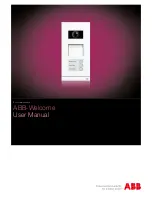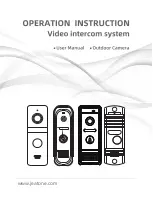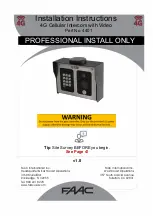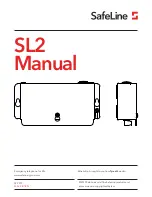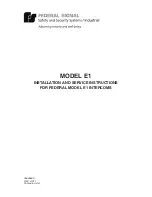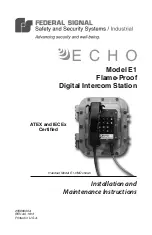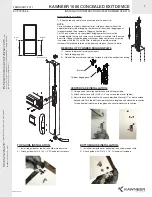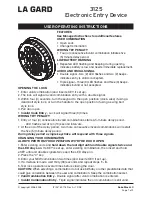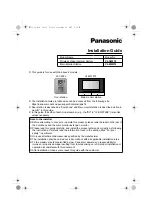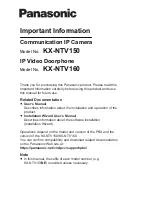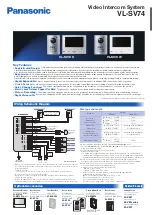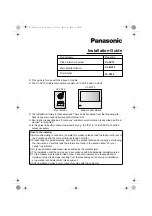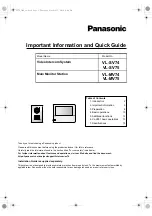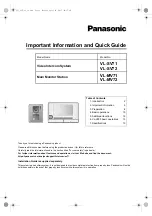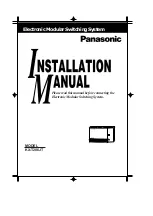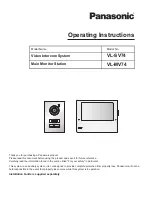
19298
19299
19300
Version 06
3/28/2016
work, see TROUBLESHOOTING.
3. Hold the back plate of the push button
in the selected location with the arrow
on the back of the back plate pointing
up.
4. Using the 1/16
" drill bit, drill a hole
through the back plate of the push
button
(See Figure 4 — Mounting hole
locations) and into the surface of the
selected location.
5. Secure with the two screws provided.
6. Press front housing onto back cover.
7. Test operation. If chime does not work,
see TROUBLESHOOTING.
Temporary Push button (transmitter) mounting instructions
1. Clean the mounting location for the push button with a mixture of 50% water and 50%
isopropyl alcohol.
2. Remove protective backing from one side of the adhesive pad and attach it to the back
plate of the push button.
3. Remove protective backing from the other side of the adhesive pad and press the back
plate to the cleaned mounting location and hold in place for a few seconds to allow for a
secure bond.
Chime (receiver) mounting instructions
Plug the chime into the top receptacle of the outlet
(See Figure 5).
Extra chime receivers and push buttons available at www.byjasco.com.
Troubleshooting
If the chime does not work:
1. Make sure push button switch is pressed down and held for at least 1 second.
2. Verify battery installation is correct, noting polarity.
3. Try a fresh battery in push button.
4. Make sure chime is no further than 150 feet away from push button.
5. Ensure push button is not mounted on metal, near metal studs, or near the floor.
6. Try a new location for the chime.
7. If the chime and push button(s) do not operate, repeat the electronic pairing process of
the push button(s) to the chime in steps A-F below.
A. To clear settings: Press and hold the pairing button
on the bottom of the chime while plugging the chime
into the outlet.
B. Once chime is plugged in, release the Pairing button.
C. Press and hold the Pairing button again. You will hear
the “Ding Dong” melody twice, and then the double
beep to alert you the chime is ready to pair with the
push button. Release the pairing button.
D. Press and release the push button
(See Figure 3). You
will hear one beep letting you know the chime accepted the signal.
E. Wait 10 seconds and you will hear the double beep again to alert you the chime is now
paired with the push button.
F. Press the push button to test.
Functional range may be adversely affected by one or more of the following factors:
weather, radio frequency interference, low transmitter battery, and obstructions between
the transmitter and receiver.
This device complies with part 15 of the FCC rules. Operation is subject to the following
two conditions:
(1) this device may not cause harmful interference, and (2) this device must accept any
interference received, including interference that may cause undesired operation.
FCC NOTE: The manufacturer is not responsible for any radio or TV interference caused by
unauthorized modifications to this equipment. Such modifications could void the user’s
authority to operate the equipment.
NOTE: This equipment has been tested and found to comply with the limits for a Class B
digital device, pursuant to Part 15 of the FCC Rules. These limits are designed to provide
reasonable protection against harmful interference in a residential installation. This
equipment generates, uses and can radiate radio frequency energy and, if not installed
and used in accordance with the instructions may cause harmful interference to radio
communications. However, there is no guarantee that interference will not occur in a
particular installation. If this equipment does cause harmful interference to radio or
television reception, which can be determined by turning the equipment off and on, the user
is encourage to try to correct the interference by one or more of the following measures:
• Reorient or relocate the receiving antenna.
• Increase the separation between the equipment and receiver.
• Connect the equipment into an outlet on a circuit different from that to which the
receiver is connected.
• Consult the dealer or an experienced radio/TV technician for help.
MADE IN CHINA
GE is a trademark of General Electric Company and is under license by Jasco
Products Company LLC, 10 E. Memorial Rd., Oklahoma City, OK 73114.
This Jasco product comes with a 1-year warranty. Visit
www.byjasco.com for warranty details.
Questions? Contact us at 1-800-654-8483 between 7:30AM—5:00PM CST.
Wireless Door Chime
Installation instructions
Required tools: Small flat blade screwdriver, #2 Phillips screwdriver, and 1/16" drill bit
(not included)
The wireless door chime kit has two components:
Installing battery in push button (transmitter)
1. Remove the front cover of the push button housing by pushing a flat blade screwdriver
into the slot at the bottom of the push button housing
(See Figure 1).
2. Install the CR2032 battery (included) with the po) side up.
3. Keep the front cover off the push button until melody selection is complete.
NOTE: the chime and push button(s) have been electronically paired during production.
Once the battery is installed in the push button and chime is plugged in, press the push
button(s) to ensure that the push button(s) cause the chime to operate.
IF CHIME DOES NOT SOUND, SEE TROUBLESHOOTING.
Melody Selection Setting (your chime will have either 2 or 8 melodies)
Select the melody by pushing the Melody selection button located inside the push button
housing
(See Figure 1). Press and release the melody selection button until you hear the
desired melody. Table 1 and Table 2 shows the order the melodies will be heard.
The last melody played will be your selected chime melody.
Volume Adjustment
There are four volume settings on this chime.
1. To adjust the volume, press and release the pairing button on the chime to play
the melody.
2. While melody is playing, press and release the volume button on the chime
to select the desired sound level.
Push button (transmitter) mounting instructions
NOTE: Avoid mounting on metal surfaces, as it may result in
a reduced range of transmission. Do not mount in an area
exposed to direct rain. Push buttons are typically mounted
at the same height as the door knob or handle (between 36
"
and 44
" above the floor).
Permanent push button (transmitter)
mounting instructions
1
.
Remove the front cover of the push button
(See Figure 1).
2. Before mounting, choose a mounting location that is no
further than 150 feet from the chime unit location. Place
the push button where you would like to mount and test
with the chime as close to its final location as possible. If
it works, continue with mounting the button. If it does not
Chime (Receiver) Figure 2
Volume
Pairing
Push
button
Mounting
hole
locations
Battery
compartment
Melody
selection
button
Push
button
Push flat blade screwdriver into
the slot to open the cover
Figure 3
Plug the chime
into the top
receptacle of
the outlet
Figure 5
Table 2 - 8 Melody Chime
1 Dingdong
2 Westminster
3 Knocks (3 times)
4 Fanfare
5 Mozart
6 Good Vibes
7 Patriotic
8 Tango
Table 1 - 2 Melody Chime
1 Dingdong
2 Westminster
Push Button (Transmitter) Figure 1
Push
button
Mounting
hole
locations
Battery
compartment
Melody
selection
button
Push
button
Push flat blade screwdriver into
the slot to open the cover
Mounting
hole
locations
Battery
compartment
Melody
selection
button
Push
button
Figure 4



